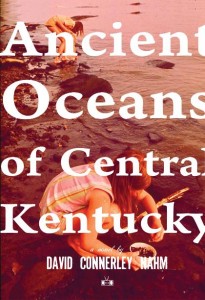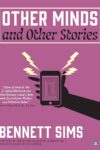 [Two Dollar Radio; 2014]
[Two Dollar Radio; 2014]
Ancient Oceans of Central Kentucky will challenge you. It will leave you dizzy, wistful, and drained, like you might feel if you mounted one of those long-vanished schoolyard merry-go-rounds and felt again the familiar rush of fear and delight, mixed now with a bittersweet surge of searing nostalgia and the return of a thousand long-forgotten memories. Writing it apparently wasn’t a cakewalk either: Kentucky native David Connerley Nahm spent nearly 15 years hunkered in empty offices and deserted malls typing, jotting, and scrawling a 400,000 word manuscript that he then painstakingly pared down to 55,000 words. What he has finally delivered is a book as dazzling and unsettling as a lone firework suddenly bursting — then just as quickly vanishing — on an otherwise dark, quiet night. Your heart might race, your eyes might hold the flash, your ears might ring, but when it’s all gone, you’ll want it back. So it is with this book, which, as much as anything, is about that destructive, irrational, yet wholly irrepressible desire for the past to somehow return, and, at the same time, the terror we’d feel were that wish to be unexpectedly granted.
Ostensibly, the plot of Ancient Oceans, which nestles itself nicely alongside Winesburg, Ohio and Our Town in the modest but magnificent tradition of small-town chronicles in American literature, involves a woman, Leah, who leads a lonely and thankless life running a non-profit in her hometown of Crow Station, Kentucky, and whose quiet existence is abruptly disrupted when a man shows up claiming to be her brother, Jacob, who disappeared years before and has long been presumed dead. This premise could easily lay the ground for a conventional, half-baked mystery, in which readers are kept in suspense as the details of the disappearance and the true identity of the man claiming to be the lost child are slowly, calculatedly revealed. (And indeed, Nahm does follow this formula to some extent with a kind-of-maybe reveal towards the end; but, by that point, he has built up layers of ambiguity and disorientation to such an extent that certainty and clarity no longer seem possible or even desirable.) In Nahm’s hands the “premise” is not what the book is “about” — rather, he uses the basic set-up of a formulaic thriller to pose and then inventively explore a set of questions: What would happen if the past did return? What if the dead lived again? What if the creatures outlined in the fossils beneath our feet, which form the literal foundations of our towns, came back out of the earth fully formed, disrupting the very bedrock of our existence?
At the beginning of (and then interspersed throughout) Ancient Oceans there are detailed drawings of fossils found in the rocks of Kentucky, taken from an 1889 monograph. As in Breece D’J Pancake’s “Trilobites,” which also fixes its gaze on small moments in the lives of overlooked people in an overlooked place, the fossil motif serves as a reminder of the simultaneous persistence and withdrawal of the past: the traces of the long-dead or long-gone form the basis of our physical and psychological surroundings, and yet the beings, objects, and events they point to are irrevocably beyond our reach. For Leah, her town itself has this sort of duality, projecting both the present and the past at once in a kind of double exposure: “There were two Crow Stations, one superimposed atop the other, one seething with light and color and people walking along real sidewalks in the new rays of the young sun and it was not the one she saw out the window of her office.”
Leah constantly grasps for the first Crow Station, the one of her childhood, attempting to force it back into the present and “drink any of that old light that might still be out there” in the “folds of memory that flickered and cut and consumed so many of her hours.” For Leah, the past is encapsulated in and fused with the figure of her brother and his loss, wrapped up in guilt and regret. Every memory involving him is a reminder of his absence, and every experience without him carries the “what if” of an alternative reality in which tragedy did not strike. Jacob’s disappearance has become part of the town’s collective memory as well, forming the basis of children’s ghost stories and idle adult chatter, leaving a tangible mark in the town’s very soil in the form of an empty grave.
Nahm spends the first 200 pages or so jumping deftly but dizzyingly between Leah’s childhood memories, those of her parents and other (often nameless) townspeople, and the present, as Leah becomes aware that someone claiming to be her brother is looking for her. He creates a kind of panoramic montage of the subjective experience of a small town, splicing together grainy, flickering images of life out of time and out of context, exploring the blurred interplay of past and present. This reaches a crescendo around page 100 with a nine-page segment that begins simply with “Crow Station, Kentucky:” and consists in the rapid-fire delivery of close-up snapshots in sentence form, moments in the lives of people and places as they flash by and fade away. Patterns emerge, stories repeat with slight changes, the town comes to life, and then darkness, like the end of a film strip.
The final quarter of the book is by far the most action-packed (though I used those words loosely), as it focuses almost entirely on the consequences of and events surrounding Leah’s would-be brother’s return. Again, in another book this part would be all about tracking down the facts and skillful plot machinations, but, because of the complexity and richness of the psychological landscape developed in the earlier chapters, we remain inside the experience rather than objective observers.
Nahm’s emotion-drenched, impressionistic approach doesn’t always work. There are more than a few hackneyed images (children who “licked with sugar sticky lips,” whispers that are “lips tickling earlobes”) and cringe-worthy flourishes (“Sea-shattered remnant and so too will these baby bones be”). But there is, even at the lowest points, a genuinely refreshing absence of irony and self-consciousness that reflects the intensity and authenticity of the feeling behind this book. The flow from the head and heart to the page is so tangibly direct, the emotion poured into words so rugged and raw, that if, at times, that means clumsy prose, so be it — I’ll still take it over the kind of slick, over-processed writing that reeks of editor intervention and marketing plans. Writing this was clearly something of a spiritual catharsis for Nahm, and its power as a book can, perhaps, be measured by its ability to facilitate the same for the reader. And if my own soul-plunging experience is any indication, Ancient Oceans is an electrical storm.
Alex Houston is a Pennsylvania-bred bookseller currently living in Chicago.
This post may contain affiliate links.







